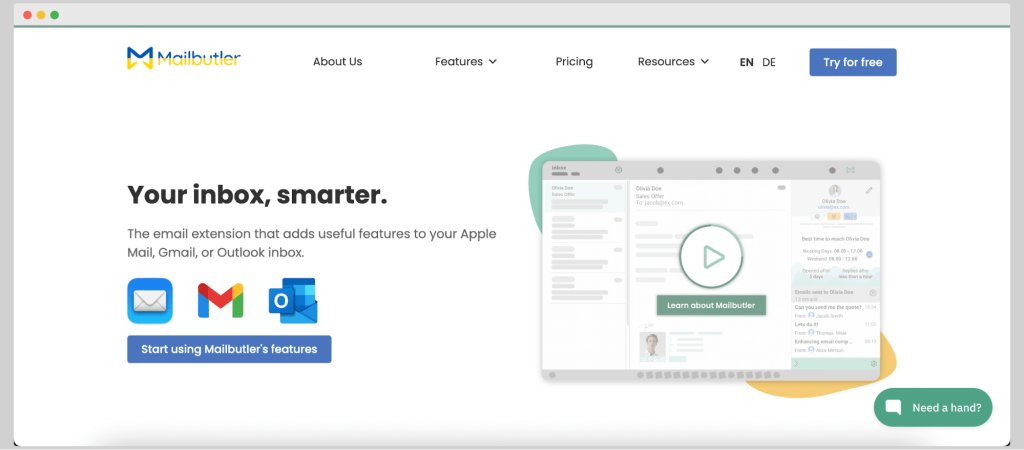Want to supercharge your email marketing with features like tracking, scheduling, and follow-ups? Mailbutler does just that. But if you’re aiming for serious email marketing power, is it a full-fledged email marketing platform?
Let’s explore its features in detail and get to know a few alternatives that can offer more for your outreach needs and help you find the right fit for your strategy.
What is Mailbutler?

Mailbutler is a definitive email productivity extension that helps you inbox smarter by adding advanced features to your Gmail, Apple Mail, or Outlook inbox.
It enables you to manage your email with more accountability and efficiency, making it an accountability and productivity partner for professionals and teams.
Mailbutler offers productivity-boosting features like email tracking, professional email signatures, an AI-powered assistant, templates, and task management.
Key features
- Email tracking: Know when emails are opened, and links are clicked, helping you track engagement.
- AI-powered email assistant: Automatically creates tasks, corrects grammar, and writes replies.
- Professional email signatures: Easily create customizable and branded email signatures.
- Mailbutler mobile app: Manage your inbox from your mobile phone and track emails on the go.
- Dedicated customer support team: To take care of troubleshooting quickly.
- Advanced inbox features: Includes everything from email tracking to email templates, making your inbox a hub of productivity.
How much does Mailbutler cost?
- Mailbutler Tracking Plan: $4.95 per user per month.
- Mailbutler Professional Plan: $8.95 per user per month.
- Mailbutler Smart plan: $14.95 per user per month.
- Mailbutler Business plan: $32.95 per user per month.
For those interested in committing annually, there are discounts available.
Cons of Mailbutler?
- It can slow down your email inbox at times, especially in Apple Mail.
- Some pricing tiers can feel a bit overwhelming for users, with too many options between plans.
- Lower-tier plans don’t offer custom signatures.
- Tracking features might not work with all recipient servers.
Reviews of Mailbutler
- “Some recipients’ servers strip tracking ability. Also, some servers tend to prevent accepting emails because of the large number of recipients in the email. The workaround is to group the emails, but then you will lose the ability to have everyone’s replies visible to all recipients.” Source: G2.
- “They also have too many pricing tiers. Also, you cannot create a custom signature without moving up from Professional to Professional Plus… Custom signatures should be a basic feature for all tiers of subscribers. […] Mailbutler tends to slow down and sometimes even crash AppleMail… it seems to me that fully building the Dashboard and other settings into the Mail plugin itself is the source of the problems.” Source: G2.
What to use instead of Mailbutler?
If you feel Mailbutler is not the tool that checks all the boxes, go through other options.
#1 Woodpecker

Woodpecker is an email automation tool designed for businesses that want to manage cold email outreach.
It integrates with Gmail and Outlook to make it easy for teams to track their emails and manage follow-ups. You can craft message templates, personalize emails, and keep track of customer communication. Woodpecker helps improve customer relationships by automating repetitive tasks and providing detailed email tracking.
Key features
- Inbox rotation: Alternates between inboxes to avoid sending limits and ensure deliverability.
- Free email validation: Ensures that all email addresses are verified, reducing bounce rates.
- Adaptive sending: Adjusts sending speed based on engagement to maximize email deliverability.
- Centralized inbox: Manages all email accounts in one place for better organization and oversight.
- Domain audit: Checks the health of your sending domain to ensure it remains trustworthy.
- Condition-based campaigns: Automates responses based on recipient behavior for tailored follow-ups.
- Free warm-up: Gradually increases your sending volume to warm up new email accounts.
- GDPR compliant: Follows strict data protection regulations to ensure privacy and legal compliance.
How much does Woodpecker cost?
- Cold Email plan: $29 per month.
- Agency plan: $29 per month, with additional clients for $27 per month.
Cons of Woodpecker?
Woodpecker’s strong focus on cold email might be a con for some users because it limits the tool’s versatility.
For businesses or individuals focused heavily on cold email outreach, this focus can be a benefit. Woodpecker provides powerful tools like inbox rotation, condition-based campaigns, and detailed tracking that are all optimized for cold email strategies.
So, while it may be a limitation for some, it’s perfect for those who rely on cold emails to drive their campaigns.
User’s reviews
- “It was intuitive for me to use and was really great for analyzing the campaigns, exporting, editing, and adding contacts. I really liked the quality of the reports I could export from the platform. Easy to create AB testings and create automatization sequences.“ Capterra
- “I have been using Woodpecker every day for several years on my agency account. In my opinion, it is the best cold mailing tool. The platform is intuitive despite its advanced features. Even new members of our team can quickly create and manage campaigns on their own.“ G2
- “We have been using Woodpecker for about two years now, and we have found it to be a really impressive tool in our mission to streamline cold email outreach in our organization.” Capterra
#2 Clay

Clay is a platform designed to scale personalized outreach and lead generation for businesses. It enriches contact data from over 75 sources and automates outreach using AI.
Independent professionals and marketers can use Clay to streamline their prospecting process, sending hyper-personalized messages to prospects, clients, and contacts. The tool allows for real-time data updates, making sure you always work with accurate and up-to-date information.
Key features
- Data enrichment: Consolidates data from 75+ sources to create detailed profiles of prospects and contacts.
- AI-powered messaging: Automatically generates personalized outreach messages tailored to each prospect.
- Chrome extension: Lets users scrape leads directly from the web, speeding up the lead generation process.
- Integration with CRM: Syncs enriched data with your CRM, allowing for seamless workflows.
How much does Clay cost?
- Free Plan: 100 credits per month.
- Starter Plan: $149 per month for 2,000 credits.
- Explorer Plan: $349 per month for 10,000 credits.
- Pro Plan: $800 per month for 50,000 credits.
- Enterprise Plan: Custom pricing available.
Cons of Clay
- The credits system may feel confusing to some users.
- Learning the platform’s features can take time.
- Pricing may be high for smaller teams.
- Limited outreach templates are available.
User’s reviews
- “HubSpot integration has a few bugs but they’re working with me on it.” – G2
- “The clay credits are overpriced. They’re not valuable over using the API key directly.” G2.
#3 Mixmax

Mixmax is a sales engagement platform designed to help businesses automate and optimize their sales outreach across multiple channels like email, phone, SMS, and social media.
It offers an AI-powered sequence builder for personalized sales campaigns and integrates with tools like Salesforce, Google Calendar, and ZoomInfo. Mixmax supports workflow automation and helps teams manage customer communication.
Key features
- AI-powered sequence builder: Automates personalized email sequences to engage prospects more effectively.
- Smart scheduling functionality: Makes it easy for prospects to book meetings directly from emails with one-click scheduling.
- Detailed analytics: Tracks content performance across channels, providing insights into engagement and outreach success.
- Workflow automation: Automates repetitive tasks like sending follow-ups or updating CRM data, saving time for sales teams.
How much does Mixmax cost?
- SMB plan: $29 per month.
- Growth plan: $49 per month.
- Growth+CRM plan: $69 per month.
- Custom enterprise plan available upon request.
There’s also a free plan.
Cons of Mixmax
- Can be expensive for small businesses.
- Customer support could be better.
- The email and sequence creation interface is not very intuitive.
- Salesforce integration can be unstable.
Users’ reviews
- “I wish there were plans that would allow me to share Mixmax with a team.” G2.
- “Some features can be tricky to figure out at first, but the support is there when you need it.” G2.
#4 Yesware

Yesware by Vendasta is a sales engagement platform designed for email outreach. It is used by individuals, teams, and enterprises to streamline email communication, track customer interactions, and close more deals.
The tool integrates with Gmail and Outlook, allowing users to manage email outreach, track engagement, and automate workflows directly from their inbox.
Key features
- Email tracking: Get real-time notifications for when emails are opened and links are clicked, helping to gauge interest and engagement.
- Email templates: Save time by using pre-built email templates to send consistent, personalized messages across your team.
- Multichannel campaigns: Combine email with LinkedIn and other channels to improve engagement.
- Analytics and reports: Track the performance of email campaigns to make data-driven decisions about outreach strategies.
How much does Yesware cost?
- Pro: $15/user per month
- Premium: $35/user per month
- Enterprise: $65/user per month
- Custom enterprise plan available.
A free plan is offered as well.
Cons of Yesware
- Lower plans lack advanced features
- Issues with reminder alerts not working reliably
- Reporting could be more detailed and customizable
- Integrates with only one CRM (Salesforce)
Users’ reviews
- “Can’t trust the data, that’s for sure.” G2.
- “It often times disconnects from Outlook. It doesn’t show me within the email itself if someone has opened it.” G2.
- “The UI can be better.” G2.
Conclusion
If you’re managing large-scale outreach or need advanced automation, you might find Mailbutler falls short. It’s great for adding productivity features to your emails, but you may need something more robust for comprehensive campaigns.
One of the tools that provides that is Woodpecker. It supports advanced automation, smart follow-ups, seamless CRM integration, and more. Sign up for free, and try this tool out.

